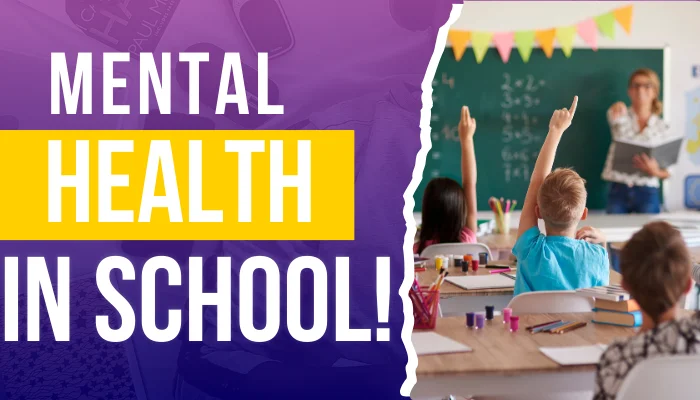Schools have a far greater responsibility to promote and optimize students’ physical, social, and mental health. Preventive measures for mental health in schools in India address the curative, preventive, and promotive dimensions of students.
Unlike physical health, mental health is often invisible. Most of the time we undermine the problems due to their inherent elusive nature. When someone has a physical ailment like a headache, stomach ache, or fever, they visit a doctor. But when someone is depressed for 10-12 days, not talking, eating, or drinking, their family may not recognize their emotional ailment.
Being silent for a long time may be a sign of mental health, that may require proper treatment. Therefore, we need to start talking about mental health and raise awareness about it.
But why we are talking about mental health in schools in India? Perhaps school is the best place to learn, admire, and shape character, molding thought processes to control emotions which further enables students to play a significant role in society.
Do you know what is the difference between Illness, Disease, and Sickness?
Illness
This refers to the subjective experience of feeling unwell or unhealthy. Illness is a broader concept that encompasses both physical and mental conditions.
Disease
This refers to a specific medical condition with defined symptoms and signs. Diseases have identifiable causes and can often be diagnosed through medical tests.
Sickness
This term is often used in a more general and social context. It refers to the state of being unwell and can include both the experience of illness and the presence of a disease.

No education system is effective unless it promotes the mental health and well-being of its students, staff, and community.
Mental illness refers to specific conditions such as Schizophrenia, Bipolar disorder, Depression, Anxiety, and many more. The term mental disability is associated with mental illness.
Mental health is very important but unfortunately, we ignore it and continue to suffer unnecessarily.
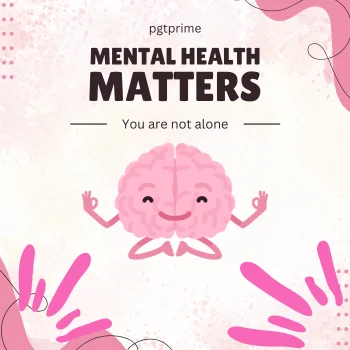
NEP 2020 Highlights the urgent need for ensuring not only cognitive development but also building character and creating holistic and well-rounded individuals equipped with key 21st-century skills.
NEP 2020 Emphasizes students’ mental health and well-being to holistic development.
We aim to provide ideas on how to foster and support the well-being of children in school, which involves their emotions, behavior, and social interactions. This is what we mean by School mental health. In our blog, we share information on how to enhance this aspect of their lives in school. so let’s explore mental health in schools in India with us.
The Hidden Gems: KVS LDCE Question Paper 2023 download.
Aims and Objectives of Mental Health in Schools in India
“WHO” in the European Ministerial Conference on Mental Health – 2005 endorsed the statement “no health without mental health”. Its main highlights were.
- To promote mental health, prevent mental illness, and enable recovery from mental illness of students.
- To gain an understanding of the perception of school students on different aspects of mental health and well-being.
- Nurturing a mental health-promoting school environment.
- To reduce the prevalence and impact of risk factors associated with mental health problems of students in school.
- To reduce stigma associated with mental health problems of students in school.
- To reduce the risk and incidence of suicide and attempted suicide among students.
- To improve utilization of mental health promotion and care in school.
Role of School in Achieving Aims of Education
Mental Health in School Students

Mental Health Issues Among Students:
- Typical & Atypical depression.
- Generalized anxiety disorder.
- Dissociative disorder and Conversion disorder.
- Social Anxiety disorder.
- Autism and ADHD disorder.
- Gender identity disorder.
- Obsessive compulsive disorder.
- Perception disorder and phobia.
Student’s mental health in schools in India
All these types of disorders bring sadness and feelings of worthlessness which may lead to suicidal thoughts among students.
According to the WHO, anxiety disorders are most prevalent among 10 to 19-year-olds. This chart helps us understand our vulnerability and the age groups associated with different types of mental disorders.
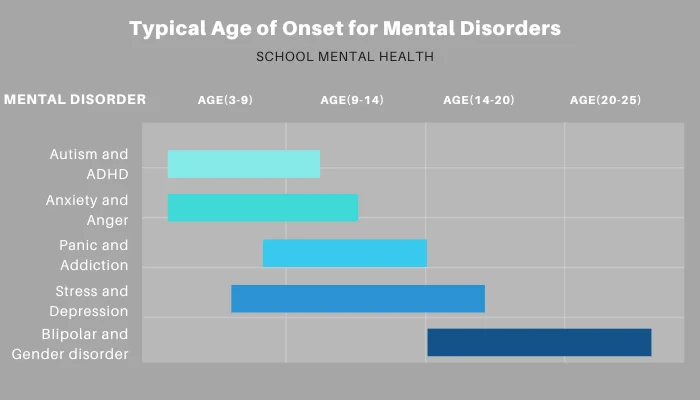
Age of onset for Mental disorder regarding mental health in schools in India
Schools can be a great location for mental health, promotion, early identification, and intervention. Many mental disorders begin in youth time when youth are in or entering high school college, or university.
Role of ICT in Education: Learning at the Speed of Light
Problems of Students Mental Health in School Lead to
Mental health problems can affect how someone handles stress, relationships with family and friends, and decision-making. Issues with school mental health do not necessarily indicate a mental illness, but it’s important to watch for warning signs in students, as these should not be overlooked or ignored.
- Trouble in school performance, excessive absence, and difficulty in paying attention.
- Extreme mood changes in students.
- Hyperactive behavior of students.
- Frequent stomach aches and headaches.
- Extreme silence.
- Shift towards anti-socialization.
- Easily irritated.
Students mental health in schools in India lead to various negative outcomes for students, such as:
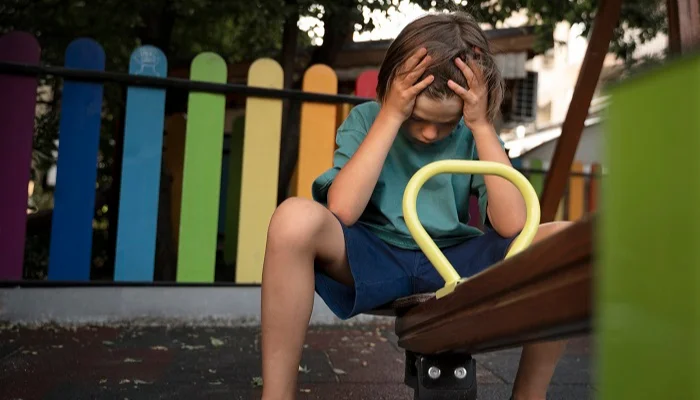
Mental Health Problems May Lead to:
- School Dropouts.
- Poor in Academics.
- Difficulties in learning.
- Behavioral Issues.
- Depression and suicide.
- School failure.
Problems of mental health in schools in India
Master your Skills by CBSE Competency Based Education (CBE)
Importance of Mental Health in School
Many mental disorders begin during youth when individuals are in or entering high school, college, or university. Sound mental health in students forms the foundation for holistic development, nurturing, and acquiring life skills that support their growth, self-preservation, and sustainable development.
Positive Mental Health = Success in Life
Children’s success in school and life is directly linked to their mental health, which includes adaptability and the ability to cope effectively with daily life challenges.
- Children can make adjustments.
- They have a sense of personal worth and importance.
- They can give and accept love.
- Children can have a sense of responsibility and become goal-oriented.
- They can better understand the difference between school work and personal life.
- They can solve their problem on their own.
- They should live in the world of reality.
Childhood experiences, memories, and unconscious mental activities play crucial roles in shaping human behavior and emotions, as well as in the development of mental illness.
| Positive Behaviour towards Children | Negative Behaviour towards Children |
|---|---|
| Make children Bold ambitious and courageous in the Future. | Make children Antisocial and Avoidant Personality Disorder in the Future. |
National Common Entrance Test (NCET 2024): A 4-year Integrated B.Ed Education Program
Illness-wellness Continuum of Mental Health in School in India
The Illness-Wellness Continuum is a valuable framework for understanding mental health in educational settings. Let’s explore it:
- The mental health continuum describes a range of states, with mental health and mental illness at the two extreme ends.
- Individuals occupy different points on the mental health continuum, influenced by both internal factors (such as emotions, thoughts, and coping strategies) and external factors (such as social support, environment, and stressors).
- There are distinct markers within the continuum: These are Positive Point: Students here are generally satisfied, emotionally well-balanced, stable, and goal-oriented. Negative Point: Students here are generally dissatisfied, depressed, and stressed.
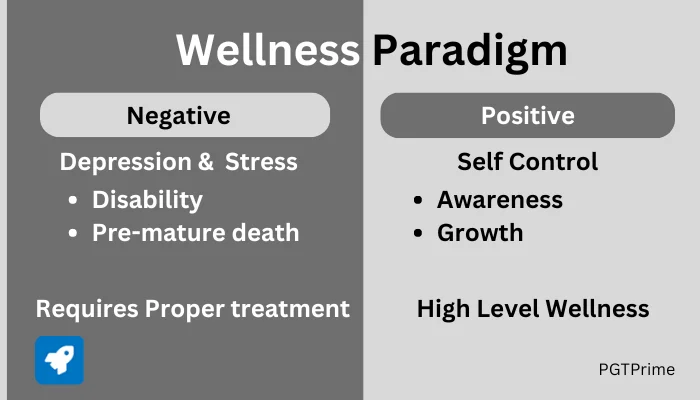
mental health in schools in India
Experiential Learning Activities: Study is fun
How to Promote Mental Health in School
Education and mental health are fundamental human rights for children and youth. The necessity of mental health support in schools is clear, as many students encounter challenges and stressors that impact their mental well-being.
- Schools can be a great location for mental health, promotion, early identification, and intervention.
- Schools are also great locations for combating the stigma associated with mental illness.
- Schools develop and implement a mental health curriculum.
- Schools train teachers to understand and recognize mental health problems in students
- Schools develop region-specific infrastructure and support for the treatment of mental health problems.
The Dawn of a New Era: National Curriculum Framework 2023 (NCF 2023)
School Mental Health Programmes by Government
Various initiatives for enhancing mental health in schools in India for students have been taken by the government. These are:
- A National Toll-free helpline (844-844-0632) Has been set up to provide Tele counseling to students across schools colleges and universities and for their parents and teachers to address their mental health and psychological issues.
- National Mental Health Programme 1982.
- National Mental Health Programme 2014.
- Series of webinars “Paricharcha” held under “Manodharpan” to create awareness about the mental health and well-being of students.
- “Manodarpan” an initiative by the Ministry of Education on 21st July 2020, as a part of “Atma Nirbhar Bharat Abhiyan“, aimed to provide psychosocial support to students, teachers, and families for mental health and emotional well-being.
- ” Sahyog live interactive sessions” are held every day for students of classes 6 to 12 from 5 to 5:30 PM on the PM E-vidya Channel with a focus on promoting mental health in schools in India among students.
- Ministry of Education has come out with a handbook and training module on “early identification and intervention for mental health problems in school-going children and adolescents.”
- The government comes with overarching guidelines for NEP 2020 and safe schools (MOE 2021).
- National suicide prevention lifeline.
- Hospitals or medical centers with psychological services.
FLN Mission 2022: Unlock the Potential of Learner
Mental Health in School Setting
Mental health in schools in India framework within a school context delineates the objectives, approaches, and measures aimed at fostering and upholding the psychological health and welfare of both learners and educators.
A Mental Health in schools in India apply Action Plan that can also demonstrate the school’s commitment and accountability to the mental health agenda. This includes:
- Departments of psychology in schools.
- Whole school approach: It uses universal preventive strategies and targeted interventions to enable all members of the school community to flourish and maintain their mental health. 8 principles of the whole school approach are used in promotion of mental health in schools in India, These are:
- Leadership and management.
- Student voice.
- Staff development health and well-being.
- Identifying needs and monitoring impact.
- Working with parents families and carers.
- ethos and environment.
- Curriculum and teaching.
- Targeted support and appropriate referral.
NIPUN Bharat Mission (2024): An Amazing Initiative in Education
Mental Health in School Curriculum
- School management committee: This committee comprises teachers, parents, community, special educators, school counselors, and school administrators, essential for fostering positive mental health among students. They work with various stakeholders to create a supportive school climate and improve student well-being and learning.
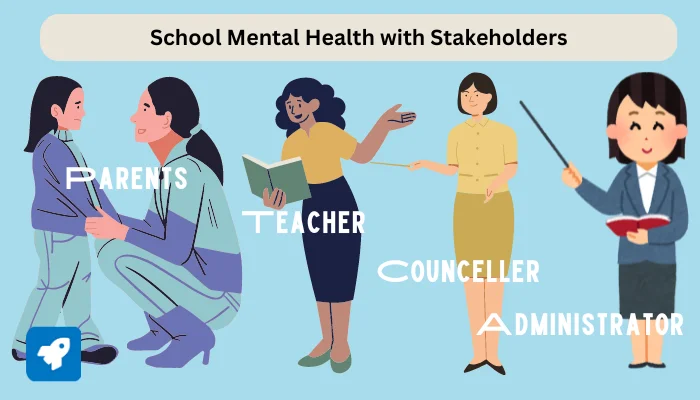
Parents » Mental health in schools in India
- Communicate and establish a network with the school.
- Enroll in parent education.
- Participate in academic planning.
Teachers » Mental health in schools in India
- Sensitive towards the needs of students and able to identify mental health-related issues on time.
- Classroom guidance and intervention to enhance academic success.
- Academic support in learning style assessment.
Special Educator and Counselor » Mental health in schools in India
- Collaborating with Teachers to devise a complete education program.
- Coordination of plan effectively for an individualized education plan.
- Understand the needs of students and provide therapy.
School Administrator » Mental health in schools in India
- Organize behavior management plans.
- Anti-bullying policy.
- Student data and results.
- Student-wide need assessment.
mental health in schools in India
ECCE (2024): The Best Power of Play in PreSchool
Ways to Improve Mental Health in School in India
Schools can play a vital role in fostering the mental health and well-being of students by implementing various techniques, resources, and strategies used by teachers and school counselors to improve the health condition of students.
| Improvement of mental health in schools in India | |
|---|---|
| Technique by Teacher | Technique by the School Counselor |
| Behavior Therapy: Behavior therapy can be used to treat various mental health conditions, such as anxiety, depression, phobias, substance use disorders, and more. Some common techniques of behavior therapy include exposure, reinforcement, modeling | Cognitive Therapy: Identify and change negative or distorted thoughts, beliefs, and emotions that affect students’ behavior and modify their thinking patterns. |
| Defense Mechanism: Used to protect a student from anxiety, stress, or unpleasant feelings, such as denial, repression, projection, displacement, regression, sublimation, rationalization, reaction formation, and more. | REBT Therapy: Rational Emotive Behavior therapy helps students to identify and change their irrational beliefs and thoughts that cause emotional distress and unhealthy behaviors. |
| Cope-up Strategies: Teachers can prioritize their tasks and responsibilities, and plan their time and resources accordingly. They can also break down their goals into smaller and more manageable steps such as Avoidant copying, problem-focused copying, and active coping concerning students. | Stress and Time Management technique: Prioritize and schedule students’ tasks according to their importance, and reduce stress with the help of Yoga and meditation. |
| Stress and Time management technique: Prioritize and schedule students’ tasks according to their importance, and reduce stress with the help of Yoga and meditation. | Stress and Time Management technique: Prioritize and schedule students’ tasks according to their importance, and reduce stress with the help of Yoga and meditation. |
Embrace the change with NEP 2020 highlights
Conclusion of Mental Health in Schools in India
Prioritizing mental health in schools in India is not just beneficial but necessary for the holistic development of students. By fostering a culture of mental well-being, schools can equip students with the tools they need to navigate life’s challenges and succeed academically and personally.
Please let us know through the comment section if you want any topic to be discussed in this blog. We will try to provide an article on that subject as early as possible.
Please leave your valuable comment in the comment box! Your comments are valuable to us.
